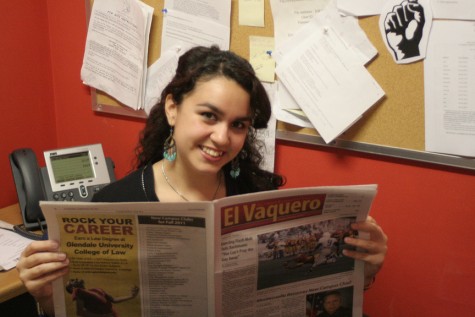The weather might say otherwise, but California is leaving its community colleges out in the cold — and it’s beginning to freeze here in Glendale.
Chancellor Jack Scott announced last week that an unexpected $149 million cut will be made to California community colleges this year. While these devastating cuts will be allocated between the 112 schools in the system, Glendale could be facing a loss of $1.9 million.
The college is still coping with the $5.7 million deficit it contended with at the start of the fiscal year, and with the additional cut, it’s not looking good for the Vaqueros.
Look around campus. What do you see? Overcrowding in outdated and unkempt classrooms, long lines at the financial aid office, bathrooms that are not regularly maintained, closed cafés, shortened business hours at the offices — this doesn’t even skim the surface.
This year students saw the elimination of the winter session, an increase in fees, and a reduction of classes offered during the summer.
In fact, Glendale used to offer two summer sessions, but in recent years, summer has been reduced to one session, and the number of classes offered is falling quickly behind — the number of classes offered this summer has dropped from 200 to 120.
This may sound like a slippery slope, and that’s because it is: if students can’t take the classes they need in the summer, that means that classes will be full in the fall. If students can’t take the classes they need in to transfer or graduate, it makes their academic goals more difficult to reach.
The college is now looking at completely cutting student worker hours as a way to absorb the financial shock.
If student workers are cut from the budget, the student body will suffer — no more tutors at the math discovery center or English language labs, no more student workers at the library, media centers, art gallery, and no more El Vaquero.
That’s right, El Vaquero is in trouble.
El Vaquero has provided students and faculty of the college, as well as the community, with news since 1927. A campus without a newspaper is a campus with an uninformed student body — an uninformed student body is disconnected from their peers, the administration and the issues that directly affect them.
Students are not the only people being affected.
This year, faculty suffered a 2.5 percent pay cut — and now, with this additional blow to the budget, there might be talks of another pay reduction, early retirement packages, or worse, layoffs. Management and classified workers will also be affected.
If California keeps cutting funding from community colleges, there will be lasting and damaging repercussions to the state of education and the public’s progress.
Community colleges have an imperative purpose to the public they serve, including: preparing students for transferring to four-year academic institutions, as well as providing higher education at a fraction of the cost; providing workforce training for the recently unemployed or those looking to gain new skills, preparing individuals for the competitive job market; as well as teaching basic English and math skills to those who are new to the country, allowing them an easier transition into American society and culture.
By cutting funding to community colleges, California is directly affecting 2.6 million students and approximately 50,000 hardworking professors, who dedicate their lives to educating the society of tomorrow.
But now what? What can we do to solve this problem?
Legislators can restore this funding, but the people must sound their voice.
Write to your representatives — call, email, fax — do whatever you can to let them know that it is a crime to cut from higher education.
For a more active approach, register for the Advocacy and Policy Conference, which takes place Sunday and Monday in Sacramento.
Visit the Faculty Association of California Community Colleges at www.faccc.org to register for the event.
The most important thing people can do to protect education is register to vote and support tax increases on the November ballot. This is a long-term solution and an investment in our future.
Remember the words of philosopher William James: “Act as if what you do makes a difference. It does.”

